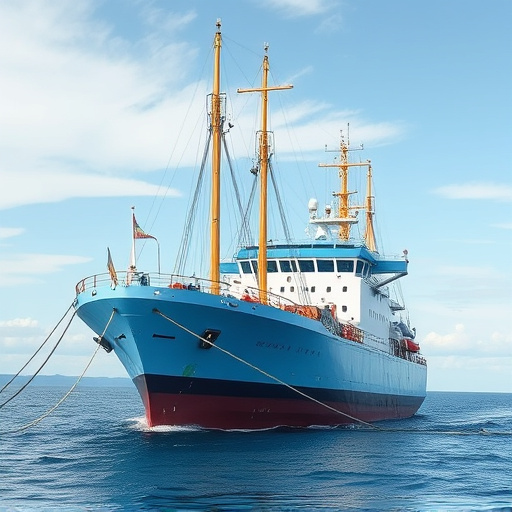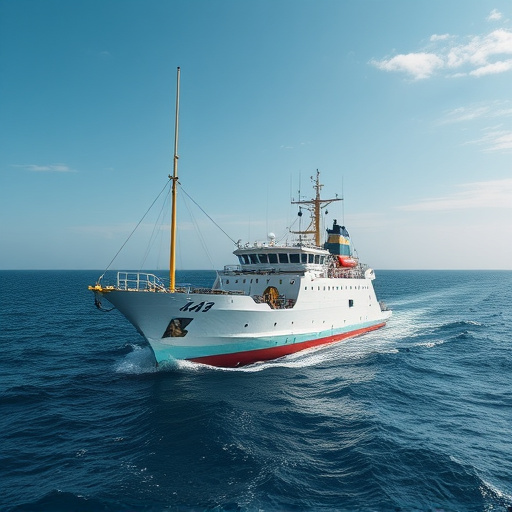Extreme environments and stringent regulations drive demand for compact, powerful, eco-friendly marine batteries. Transition from lead-acid to advanced technologies like lithium-ion (Li-ion) reduces environmental impact while boosting performance. Research focuses on eco-friendly materials, solid-state electrolytes, and improved energy density for longer durations. Innovations in charging, battery management systems, and regulatory frameworks enhance longevity and efficiency. Future trends include decentralized energy storage, smart grids, and renewable integration for greener marine power systems.
The global push for sustainability demands innovative solutions, especially in sectors like maritime transportation. As marine batteries power electric vessels, exploring eco-friendly alternatives is crucial. This article delves into the multifaceted challenge of developing sustainable marine batteries, covering material choices, recycling, energy density, and longevity. We explore cutting-edge technologies, regulatory developments, and future trends, providing a comprehensive overview of the current landscape and promising directions for greener ocean-friendly energy storage.
- Understanding Marine Battery Challenges
- Current State of Marine Battery Technology
- Eco-Friendly Materials and Recycling Methods
- Energy Density: Balancing Performance and Sustainability
- Longevity and Durability in Marine Environments
- Innovations in Charging and Discharging Technologies
- Regulatory Framework for Sustainable Marine Batteries
- Future Trends: Ocean-Friendly Energy Storage
Understanding Marine Battery Challenges

Marine batteries face unique challenges due to their exposure to harsh environments, including extreme temperatures, humidity, and corrosion. These factors demand specialized materials and designs that can withstand the rigors of marine conditions. Additionally, the high depth of discharge (DoD) required in marine applications necessitates robust cells with excellent cycle life and rate capabilities.
The weight and space constraints in marine settings further complicate matters. Vessels have limited storage and weight capacity, making it crucial to develop compact yet powerful batteries. Furthermore, safety is paramount; marine batteries must adhere to stringent regulations to prevent leaks and ensure the well-being of both vessels and their crews. These challenges necessitate innovative solutions that prioritize performance, longevity, and environmental compatibility.
Current State of Marine Battery Technology

The current state of marine battery technology is a reflection of the ongoing pursuit for more efficient, longer-lasting, and environmentally friendly energy storage solutions tailored to the unique demands of maritime applications. Traditional lead-acid batteries have long been the go-to option due to their proven reliability and affordability. However, with growing environmental concerns and stricter regulations, the industry is shifting towards more sustainable alternatives.
Modern marine batteries now incorporate advanced technologies such as lithium-ion (Li-ion) and solid-state electrolyte systems, promising enhanced performance and reduced ecological impact. These innovative solutions offer increased energy density, faster charging times, and longer lifespans compared to their legacy counterparts. The move towards greener options not only addresses the growing need for more sustainable practices but also ensures the long-term viability of the marine industry by reducing reliance on finite resources and minimizing environmental pollution.
Eco-Friendly Materials and Recycling Methods

In the pursuit of sustainable solutions for marine batteries, one key area lies in the selection and utilization of eco-friendly materials. Researchers are exploring alternatives to traditional components, such as lead-acid and lithium-ion, that pose environmental risks. These innovative options include materials like sodium-ion batteries, which offer reduced toxicity and better recycling prospects. Additionally, the integration of biodegradable polymers and bio-based composites within battery structures can significantly minimize their carbon footprint.
Recycling methods also play a pivotal role in making marine batteries more sustainable. Implementing advanced recycling techniques, such as hydrometallurgy and pyrometallurgy, ensures that valuable materials are reclaimed from spent batteries while minimizing pollution. These processes enable the recovery of critical metals like lithium, cobalt, and nickel, fostering a circular economy within the marine industry. By adopting these eco-friendly materials and efficient recycling methods, it becomes possible to significantly reduce the environmental impact associated with marine battery production and disposal.
Energy Density: Balancing Performance and Sustainability

In the pursuit of sustainable solutions for marine batteries, energy density presents a key balance between performance and environmental impact. Higher energy density means longer duration and reduced weight, making it appealing for maritime applications. However, achieving this without compromising sustainability is a challenge. Traditional materials often rely on non-renewable resources and contribute to environmental degradation.
Researchers are exploring advanced materials like lithium-sulfur (Li-S) batteries and solid-state electrolytes to enhance energy density while minimizing the use of harmful chemicals. These innovations promise higher power outputs, longer lifespans, and reduced carbon footprints, making them promising candidates for greener marine battery systems.
Longevity and Durability in Marine Environments

In the harsh conditions of marine environments, where salt water, extreme temperatures, and constant exposure to waves and currents are commonplace, the durability and longevity of marine batteries are paramount. Traditional lead-acid batteries, long the industry standard, often fall short in these settings, leading to frequent failures and costly replacements. To address this challenge, researchers and manufacturers have been developing advanced battery technologies specifically tailored for maritime applications.
Modern marine batteries leverage innovative materials and designs to enhance their performance and longevity. For example, lithium-ion (Li-ion) batteries offer superior energy density, allowing for longer runtimes between charges while simultaneously withstanding the rigors of salty seawater and varying temperatures. Furthermore, advancements in battery management systems ensure optimal charging and discharging cycles, prolonging the overall lifespan of these batteries. These sustainable solutions not only reduce maintenance costs but also contribute to a greener marine industry by minimizing environmental impact.
Innovations in Charging and Discharging Technologies

Innovations in charging and discharging technologies are revolutionizing the performance and longevity of marine batteries. Modern advancements, such as fast-charging systems, aim to reduce downtime for vessels, ensuring they can stay at sea longer without needing extensive recharging periods. These efficient charging methods involve optimized circuitry and power management strategies that minimize energy loss during the recharge process.
Additionally, developments in battery chemistry, like the use of lithium-ion technology, offer higher energy density and faster discharge rates compared to traditional marine batteries. This allows for more extended operational durations between charges while reducing the overall environmental impact associated with frequent disposal and replacement. As a result, these sustainable solutions not only enhance the efficiency of marine operations but also contribute to the preservation of our oceans by minimizing the ecological footprint of battery usage.
Regulatory Framework for Sustainable Marine Batteries

The regulatory framework plays a pivotal role in shaping the market for sustainable marine batteries, driving innovation and adoption of eco-friendly technologies. Stringent environmental regulations, such as those governing the disposal and recycling of batteries, are encouraging manufacturers to develop more sustainable products. These regulations not only set standards for battery production but also outline clear guidelines for their end-of-life management.
In response, the marine industry is seeing a surge in the development of marine batteries that incorporate recycled materials, are designed for longer lifespans, and offer improved energy density. The push for sustainability is further amplified by incentives and subsidies offered by various governments to promote the use of cleaner technologies. This collaborative effort between regulators, manufacturers, and consumers is instrumental in fostering a greener future for the marine sector, ensuring that marine batteries contribute positively to environmental conservation efforts.
Future Trends: Ocean-Friendly Energy Storage

As we look towards a future where renewable energy sources play a pivotal role, the development of sustainable marine batteries becomes increasingly crucial. Ocean-friendly energy storage solutions are at the forefront of this transition, with researchers and manufacturers exploring innovative approaches to address the unique challenges posed by marine environments. The goal is to create batteries that not only power our vessels and offshore structures efficiently but also minimize their ecological footprint.
One promising trend is the integration of advanced materials and technologies, such as solid-state electrolytes and lithium-sulfur (Li-S) chemistry. These innovations promise higher energy density, longer cycle life, and reduced environmental impact compared to traditional marine batteries. Additionally, the development of smart grid systems and floating offshore wind farms opens up new possibilities for decentralized energy storage, further enhancing the sustainability of marine energy applications.
The pursuit of sustainable solutions for marine batteries is more urgent than ever, given the growing demand for cleaner energy in the maritime industry. By leveraging eco-friendly materials, advanced recycling methods, and innovative technologies that enhance energy density and durability, we can significantly reduce the environmental impact of marine battery production and disposal. Regulatory frameworks play a pivotal role in driving these changes, while future trends hint at even more ocean-friendly energy storage solutions on the horizon. Embracing these sustainable practices is not just an environmental imperative but also a step towards a greener, more resilient maritime future.
